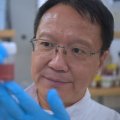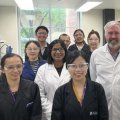The University of Queensland was today awarded more than $51 million in National Health and Medical Research Council grants that will fund research projects investigating health issues such as cystic fibrosis, respiratory illness in Indigenous children and chronic kidney disease.
UQ Vice-Chancellor Professor Peter Høj said UQ was very appreciative of the NHMRC’s strong support, and congratulated the successful researchers.
He said this funding was a reminder of the imperative to maintain the level of government investment in health and medical research.
“UQ’s record of health and medical discovery includes phenomenal products such as the cervical cancer vaccine which has been given to tens of millions of women and girls, and has been linked to dramatic declines in the incidence of genital warts in men and women,” Professor Høj said.
“A more recent result of UQ research, the Nanopatch needle-free drug delivery technology, has the potential to revolutionise disease-prevention – including in poor and remote regions.
“When the products of our research succeed in international markets, they most importantly spread the benefits of Australian research, but they can also earn export income that can be reinvested in more research.
“This round of funding from the National Health and Medical Research Council is very welcome, but it is also a reminder of what the community stands to lose if the government reduces its commitments to research.”
Five Project Grant applicants achieved outstanding results when they were each awarded more than $1 million each, namely:
- Professor David Johnson, for research into slowing the progression of chronic kidney disease ($1.92 million)
- Associate Professor Carmel Hawley, for research into reducing cardiovascular disease in people with chronic kidney disease ($1.6 million)
- Dr Darren Gray, for research into reducing soil-transmitted infections in children in China and the Philippines ($1.49 million)
- Professor Claire Wainwright, for research into protecting children and adolescents with cystic fibrosis ($1.14 million)
- Dr Jason Roberts, for research into developing better antibiotic dosing guidelines for dialysis patients ($1.04 million)
In addition, UQ received two NHMRC – European Union Collaborative Research Grants awarded to Professor Melissa Little (researching stem cells in the kidney) and Professor Peter Hill (examining new goals for global health) with a total value of $1.21 million.
This is a significant result as only five of these grants were awarded nationally, with UQ being the only institution to achieve more than one grant.
Professor Little was awarded three Project Grants, one NHMRC – European Union Collaborative Research Grant and a prestigious Senior Principal Research Fellowship.
Her combined $3.25 million in funds will go towards investigating treatments for chronic kidney disease, which costs Australia more than $1 billion per annum.
Dr Ryan Taft, from the Institute for Molecular Bioscience (IMB) who recently won a UQ Foundation Research Excellence Award, after he analysed the genome of three-year-old Massimo Damiani, a Melbourne toddler afflicted with Leukodystrophy, has successfully won a Project Grant of $650,802.
UQ Researchers awarded NHMRC Career Development Fellowships were Dr Kerry-Ann O’Grady, who will research acute respiratory illness in Indigenous and non-Indigenous Australian children and the pathways to chronic lung disease.
Dr Jason Roberts’s project will develop methods to improve antibiotic dosing for patients in the intensive care unit, while Dr Jian Yang intends to develop novel methods and software tools to better understand the genetic architecture of complex diseases and traits.
Grants administered by the NHMRC address research needs, from basic science to research translation and they support researchers and their teams through the early and mid-stages of their careers.
View the full list of NHMRC grant recipients here.
Media: Tegan Taylor at UQ Communications (07 3346 7887, 0413 601 248 or t.taylor@uq.edu.au)
.jpg)






